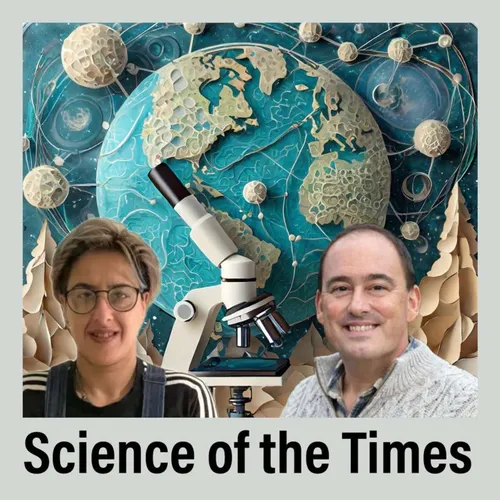
Science Of The Times
Do you want to learn a little more about topical science findings? Do many of the science stories you hear leave you with unanswered questions? Syma and Tim will discuss in non-technical language and in a fun and engaging style, recently published science findings. Guests will be authors of these papers and will include some of the world’s most exciting scientists who are pushing the frontiers of human knowledge. Covering, among other things, artificial intelligence, the search for alien life, the latest treatments for diseases, quantum computers, the science of football and topics requested by listeners, the half hour episodes will leave listeners feeling a little more knowledgeable about cutting-edge science and how scientists make discoveries.
- Update frequency
- every 5 days
- Average duration
- 32 minutes
- Episodes
- 36
- Years Active
- 2025

The Decline of the Primate Handyman
Tim and Syma talk to Professor Dora Biro about animal behaviour and cognition. Want to know why your kitten behaves differently from you, or discover that chimps become less competent at using tools…

Waspish Behaviour
In this weeks episode, Tim and Syma get the run down on wasps, courtesy of Seirian Sumner, entomologist and behavioural ecologist. Will Syma now forgive the wasps, following a recent encounter?
Seiria…

Planet Hunters: Secrets of the Exoplanet Boom
Tim and Syma talk to Ray Pirrehumbert, author of Planetary Systems: A Very Short Introduction, about planets orbiting far away stars. They learn how these distant objects that we will never visit are…

The Madness of the Silicon Valley Ultra-rich
Tim and Syma talk to Adam Becker about his stunning new book, "More Everything Forever". They explore how the philosophy of effective altruism aligns with flawed scientific ideas about how humanity c…

Fossils and Feathers: Rethinking What We Know About Dinosaurs
Tim and Syma talk to dinosaur expert, Roger Benson, from the American Museum of Natural History. They learn why there were no small dinosaurs, how the animals lived their lives, and why they are rele…

New antibiotics are needed to change the game.
Syma gives the second annual Ibn Sina lecture in Bradford City Hall. The event was hosted by the Muslim Institute and the Lord Mayor of Bradford.
She discusses her work on using computer simulations…

Jonathan Amos The Voice Behind BBC Science A Day in the Life
In This episode Tim & Syma talk to Jonathan Amos - recently retired science correspondent at the BBC. Jon talks us through his fascinating journey falling in love science through exposure to it via j…

Life’s Left Turn: The Strange Science Behind Molecular Asymmetry
Some biological molecules can be left handed or right handed - the sugars that are found in nucleic acids are right handed, whereas 19 of the 20 amino acids that make up proteins are left handed. An…

The Good the Bad and the Migrant
Migration is in the news continuously and everyone has an opinion. What does the science of migration reveal? Tim and Syma talk to Ian Goldin, an expert on the pros and cons of migration and migrants…

How did the diversity of life come about?
This week Tim and Syma talk to Max Telford, author of The Tree of Life: Solving Science's Greatest Puzzle published by John Murray. They explore LUCA, penis worms, and other oddball species.
Max's boo…

Science Explainer: Recent Mount Etna Eruption
In our latest science explainer release Syma chats to David Pyle, world renowned volcanologist, about the recent Mount Etna eruption.

Question and Answer Time!
In this episode Syma and Tim conduct a Q and A session for the many fantastic questions that have been hitting our email inbox over the last three months or so. They also review some of their favouri…

The Science Of Football
Surely there is not much more to football than kicking a ball.? Wrong, There is a whole science behind it. Professor Robbie Wilson explains his work in this area and even puts Tim and Syma through t…

Science Explainer: Why is it so hard to kill bacteria?
In this explainer, Syma discusses some of the methods bacteria use to defend themselves from attack from external threats such as antibiotics. These ostensibly simple organisms have elaborate and sop…

Why Wolves Don’t Change Rivers
Dan MacNulty has studied the wildlife in Yellowstone National Park since 1995. His research, and that of his colleagues, has revealed that the narrative that wolves have changed the park, leading to …

Science Explainer: New Funding for US based scientists looking to move to the UK.
Tim breaks down a game-changing shift in global science research: as U.S. funding for future research faces uncertainty, UK funding agencies are seizing the moment—offering incentives to attract sci…

Break Barriers: Women, the Physical Sciences Need You Now!
In this short bonus episode Syma talks to Philipp Kukura. Philipp led the development of a technique called mass photometry which enables tracking the movement of individual proteins. Here he briefly…

Why Ginger Cats Are Mostly Boys (and Why Some Wolves Are Black!)
In this third quick hit explainer of the week. Why are most ginger cats male? Simple genetics — the orange fur gene is on the X chromosome. Males only need one to flaunt that fiery coat, while female…

How To Build A Sustainable World
If we don’t build a more sustainable world our civilisation will collapse, potentially in the coming decades. Paul Behrens spends his time researching our impact on the world, and working out how civ…

AI Undermines Health Science
In our second quick-hit explainer episode this week, Tim breaks down how AI might be disrupting—not advancing—health science. Is the hype overshadowing real medical insight? Tune in for a sharp take …